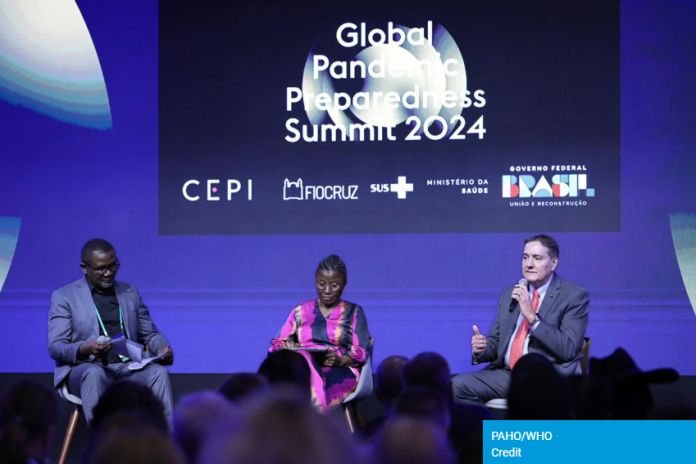– PAHO and Unitaid sign agreement to intensify collaboration to prevent and advance HIV response in Latin America and the Caribbean
RIO DE JANERIO, Brazil, (PAHO) – Addressing inequality and ensuring equitable access to health were key issues raised by Pan American Health Organization Director (PAHO), Dr Jarbas Barbosa, during a high-level event at the Global Pandemic Preparedness Summit 2024, in Rio de Janeiro Brazil.
“We all know that poverty and disease is a vicious cycle that we have to break,” Dr Barbosa said during the event – The state of global pandemic preparedness and response – but “when the health sector works properly, it can contribute to improving lives and reducing inequality.”
During the event, which included the participation of Joy Phumaphi, Co-chair of the Global Preparedness Monitoring Board, Dr Barbosa also reinforced the importance of ensuring that equity remains front and center of discussions around the new pandemic agreement.
“The main basis of global disease surveillance is trust,” the PAHO director said. “When a country shares information, data, samples, they expect to receive support,” including access to diagnostics, protective equipment, medicines, and vaccines. “If we do not meet these expectations, countries will think twice” about sharing.
“Equity is extremely important,” Phumaphi added. “Equity in consultation, in responsibility, in access and in outcomes.”
When it comes to ensuring better pandemic preparedness and response, the PAHO director and global preparedness monitoring board co-chair agreed that while the world is better prepared than before the COVID-19 pandemic in 2019, much remains to be done.
“You can’t talk about prevention, preparedness and response in one single silo,” Phumaphi said. “Everything is interrelated. We are not here today but we are getting there,” she added.
While there have been some positive developments in terms of improved genomic surveillance, the recent amendments to the International Health Regulations (IHR) and the creation of the Pandemic Fund, in the Americas “we are still far from where we need to be to be better prepared for the next pandemic,” Dr Barbosa said.
“In most countries, One Health is still a concept that needs to be translated into concrete actions,” he added. “This is the only way we have to provide early detection and to improve response.”
Meanwhile, PAHO and global health initiative Unitaid signed a Memorandum of Understanding to intensify collaboration to advance HIV response in Latin America and the Caribbean.
The US$5 million grant, which was signed in Rio de Janeiro, Brazil, on 30 July, aims to reduce HIV deaths in the region by addressing the prevention and management of advanced HIV disease.
The project will focus on identifying gaps and barriers in national HIV programs, strengthening HIV surveillance, accelerating the introduction of new tests and treatment, and training healthcare workers.
“To improve access to prevention and treatment, we must decentralize HIV care so that it is closer to patients,” PAHO director, Dr Jarbas Barbosa said during the signing of the agreement. “This grant will allow us to support countries to incorporate tools that will enable us to move even faster towards the elimination of HIV-related deaths.”
An estimated 2.3 million people live with HIV in Latin America and 340,000 in the Caribbean. Thanks to modern treatment options, the number of HIV-related deaths has declined over the past 10 years in both Latin America and the Caribbean (by 28% and 57% respectively). However, in 2023, new infections increased by 9% in Latin America, despite reductions of 22 percent in the Caribbean and 51 percent globally, highlighting an urgent need for more targeted interventions.
“This new agreement is part of our effort to support countries in Latin America and the Caribbean to get the innovation they need to fight HIV and it will consolidate the work we are already doing,” Unitaid executive director, Philippe Duneton said. “As we move ahead in the fight against HIV, I am optimistic that bringing in new tools and new public health approaches will result in the impact we want on advanced HIV disease in the Americas.”
Since 2020, PAHO and Unitaid have collaborated to support health innovations in the region of the Americas. Earlier this year, they signed a Memorandum of Understanding to intensify collaboration to end 30 preventable communicable diseases in the region by 2030, including cervical cancer, HIV and Chagas disease.
HIV infection is one of the diseases addressed in PAHO’s Elimination Initiative, which aims to eliminate more than 30 communicable diseases and related conditions by 2030.






